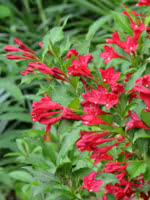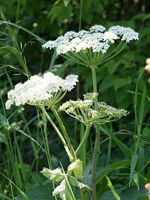Mon-Fri 9am - 5pm Mountain time
Red Prince Weigela vs Cow Parsnip
Weigela florida Red Prince
Heracleum maximum
NOT AVAILABLE THIS SEASON - MIGHT RETURN
CUSTOM GROW
Red Prince Weigela should be the next flowering shrub you add to your yard. Vibrant red tubular blooms flower two times per season, once in spring and again in late summer.
This shrub is versatile, deer and rabbit resistant, and drought tolerant once established. Try planting Red Prince Weigela as a specimen plant or for your next border/hedge.
Cow Parsnip is a native perennial wildflower known for its tall growth, very large leaves, and broad clusters of white flowers. The abundant blossoms provide nectar and pollen for a wide variety of pollinators, including bees and butterflies. Birds and small mammals feed on its seeds, while the foliage serves as a larval host for certain butterfly species.
Cow Parsnip is often among the first native perennials to establish in disturbed or open sites. It typically grows in moist meadows, along streambanks, forest edges, and roadsides. Although usually a short-lived perennial or biennial, it readily self-seeds and maintains strong populations where conditions are favorable.
Cow Parsnip is the only native Heracleum in North America and should not be confused with the highly invasive Giant Hogweed (H. mantegazzianum).
Note: The sap of the Cow Parsnip can cause phytodermatitis when exposed to ultraviolet light (sunlight). This can cause rashes or even burns. Care should be taken if pruning or handling this plant.
Red Prince Weigela Quick Facts
Cow Parsnip Quick Facts
Toxicity: sap causes skin irritation

